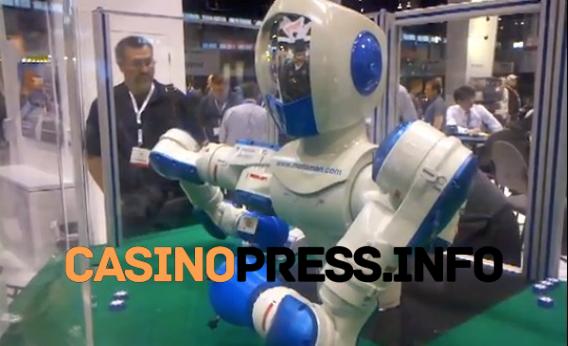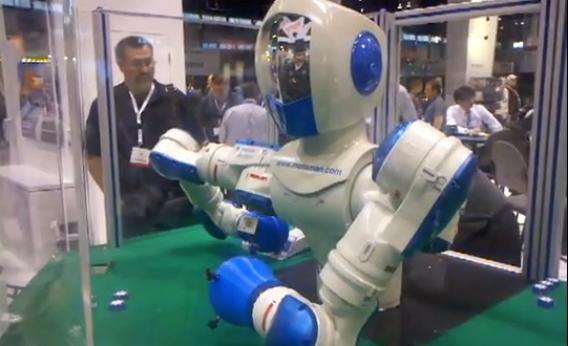Robot Casino Dealers: Are They The Way Forward?

The Future Of The Casino Dealer

Robot Casino Dealer. (Image credit: slate.com)
Here’s one poker face that’s near impossible to read. Meet Min, a prototype robot dealer. Her Macau based parent company, Paradise Entertainment hopes to introduce her and many more like her across the US in place of live dealers, where, in some states, humans are legally forbidden to deal card games.
Currently, her ability is capped at the most basic of card dealing functions, but it is thought that in the not too distant future she will be able to recognise the faces of the players at her table and converse to them in multiple languages.
Although, this isn’t the first poker table in the world with automated dealers, this is by far the most realistic looking, and with the bot’s potential, a definite leap forward in casino technology. Coincidently, there have been reports of rival tech firm Hanson Robotics selling a robot dealer earlier this year, which is more interactive and able to move its face, to an unnamed gaming company, thought to also be in Macau.
Uncanny Valley
Initial responses have been cool towards the robot, not least due to the fact that it is, frankly, terrifying and more than a little creepy. On the whole, people especially outside the pacific region, are often weirded out by lifelike robots.
It will, however, be interesting how players respond when tilting at poker and/or other angry blow-ups. In what might prove to be an insightful social experiment, will robots cop the same flack a human dealer would be expected to receive or would the aggressors swear to themselves instead?
And what should happen when the robo-dealer commits a legitimate mistake? Would the bot respond accordingly, should it, say, drop the cards? It is surely a bad idea to throw your scotch at a robot.
While people seem to enjoy watching robots from afar, they can feel threatened when asked to get up close and interact with one, particularly when it comes to artificial creations that are made to look very human. People’s brains spike after simulants pass a certain point of realism, and our responses are known by eggheads as the “uncanny valley.”
In a study at the University of California, San Diego, twenty subjects with ranging ages from 20 – 36 were shown twelve videos of the Japanese Repliee Q2 android. The subjects had been selected because none of them had worked with bots or spent time in countries where humanoid robots are more common than in other countries, like Japan.
All were shown to fidget with their hands and show conflicted brain activity when faced with the robot “skin-on” yet were strikingly more measured and calm when they saw the very same robot “skin – off.” If this is true, it certainly makes it unlikely that card players would blow up when the robot made a mistake and even less likely that they would hit on her/it. It should save a pretty penny in tips too.
Replicant Roulette
Despite the concerns, in general, the future looks bright for the bots as there are plenty of signs suggesting that, overall, their introduction is a good move for the gaming industry, and more specifically, North America. This is in part to counter labour costs as dealers in the US are traditionally paid a higher wage than their counterparts in Europe and Asia.
Also, while interaction is understandably reduced, productivity is up. These simulant shufflers are estimated to be 30% faster and far more accurate than current human dealers. It’s also quite possible that inexperienced gamers wanting to hide their rookie mistakes might source out a robot table, where they would feel the humiliation of making foolish mistakes, less.
This all follows news from Japan last year, in which the Tokyo police force raided an illegal casino and found a robot worker in what was the first known case of automated gambling dealer. In fact, the robot turned out to be a robotic arm, rather than a humanoid.
Regarding future prospects, it remains to be seen. Asians who traditionally respond better to robots would seem the best fit for the future and some Macau casinos have agreed to trial the bots. However, Asian gamblers do, on the whole, prefer the crowded “den,” where life is vibrant and people hustle and shout.
But, in North America, where automated table games are a rapidly expanding segment of the gaming industry, westerners tend to be more wary of humanoids, particularly when things are beginning to resemble Blade Runner and the Tyrell Corporation’s almost indistinguishable replicants.
So, while I don’t expect casinos and tech companies to abandon plans hastily, it might be a while before we see versions of replicant roulette or simulant slots just yet.
Source: casino.org















